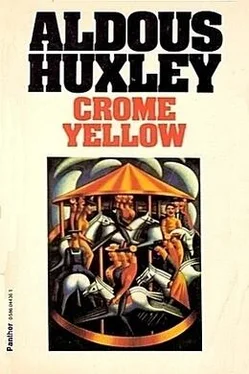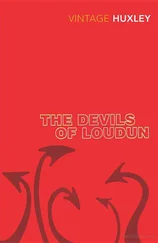"Pretty little thing, isn't she?" said Mrs. Budge huskily, and panted two or three times.
"Yes," Denis nodded agreement. Sixteen, slender, but nubile, he said to himself, and laid up the phrase in his memory as a happy one. Old Mr. Callamay had put on his spectacles to congratulate the victor, and Lord Moleyn, leaning forward over his walking–stick, showed his long ivory teeth, hungrily smiling.
"Capital performance, capital," Mr. Callamay was saying in his deep voice.
The victor wriggled with embarrassment. She stood with her hands behind her back, rubbing one foot nervously on the other. Her wet bathing–dress shone, a torso of black polished marble.
"Very good indeed," said Lord Moleyn. His voice seemed to come from just behind his teeth, a toothy voice. It was as though a dog should suddenly begin to speak. He smiled again, Mr. Callamay readjusted his spectacles.
"When I say 'Go,' go. Go!"
Splash! The third heat had started.
"Do you know, I never could learn to swim," said Mrs. Budge.
"Really?"
"But I used to be able to float."
Denis imagined her floating—up and down, up and down on a great green swell. A blown black bladder; no, that wasn't good, that wasn't good at all. A new winner was being congratulated. She was atrociously stubby and fat. The last one, long and harmoniously, continuously curved from knee to breast, had been an Eve by Cranach; but this, this one was a bad Rubens.
"…go—go—go!" Henry Wimbush's polite level voice once more pronounced the formula. Another batch of young ladies dived in.
Grown a little weary of sustaining a conversation with Mrs. Budge, Denis conveniently remembered that his duties as a steward called him elsewhere. He pushed out through the lines of spectators and made his way along the path left clear behind them. He was thinking again that his soul was a pale, tenuous membrane, when he was startled by hearing a thin, sibilant voice, speaking apparently from just above his head, pronounce the single word "Disgusting!"
He looked up sharply. The path along which he was walking passed under the lee of a wall of clipped yew. Behind the hedge the ground sloped steeply up towards the foot of the terrace and the house; for one standing on the higher ground it was easy to look over the dark barrier. Looking up, Denis saw two heads overtopping the hedge immediately above him. He recognised the iron mask of Mr. Bodiham and the pale, colourless face of his wife. They were looking over his head, over the heads of the spectators, at the swimmers in the pond.
"Disgusting!" Mrs. Bodiham repeated, hissing softly.
The rector turned up his iron mask towards the solid cobalt of the sky. "How long?" he said, as though to himself; "how long?" He lowered his eyes again, and they fell on Denis's upturned curious face. There was an abrupt movement, and Mr. and Mrs. Bodiham popped out of sight behind the hedge.
Denis continued his promenade. He wandered past the merry–go–round, through the thronged streets of the canvas village; the membrane of his soul flapped tumultuously in the noise and laughter. In a roped–off space beyond, Mary was directing the children's sports. Little creatures seethed round about her, making a shrill, tinny clamour; others clustered about the skirts and trousers of their parents. Mary's face was shining in the heat; with an immense output of energy she started a three–legged race. Denis looked on in admiration.
"You're wonderful," he said, coming up behind her and touching her on the arm. "I've never seen such energy."
She turned towards him a face, round, red, and honest as the setting sun; the golden bell of her hair swung silently as she moved her head and quivered to rest.
"Do you know, Denis," she said, in a low, serious voice, gasping a little as she spoke—"do you know that there's a woman here who has had three children in thirty–one months?"
"Really," said Denis, making rapid mental calculations.
"It's appalling. I've been telling her about the Malthusian League. One really ought…"
But a sudden violent renewal of the metallic yelling announced the fact that somebody had won the race. Mary became once more the centre of a dangerous vortex. It was time, Denis thought, to move on; he might be asked to do something if he stayed too long.
He turned back towards the canvas village. The thought of tea was making itself insistent in his mind. Tea, tea, tea. But the tea–tent was horribly thronged. Anne, with an unusual expression of grimness on her flushed face, was furiously working the handle of the urn; the brown liquid spurted incessantly into the proffered cups. Portentous, in the farther corner of the tent, Priscilla, in her royal toque, was encouraging the villagers. In a momentary lull Denis could hear her deep, jovial laughter and her manly voice. Clearly, he told himself, this was no place for one who wanted tea. He stood irresolute at the entrance to the tent. A beautiful thought suddenly came to him; if he went back to the house, went unobtrusively, without being observed, if he tiptoed into the dining–room and noiselessly opened the little doors of the sideboard—ah, then! In the cool recess within he would find bottles and a siphon; a bottle of crystal gin and a quart of soda water, and then for the cups that inebriate as well as cheer…
A minute later he was walking briskly up the shady yew–tree walk. Within the house it was deliciously quiet and cool. Carrying his well–filled tumbler with care, he went into the library. There, the glass on the corner of the table beside him, he settled into a chair with a volume of Sainte–Beuve. There was nothing, he found, like a Causerie du Lundi for settling and soothing the troubled spirits. That tenuous membrane of his had been too rudely buffeted by the afternoon's emotions; it required a rest.
Towards sunset the fair itself became quiescent. It was the hour for the dancing to begin. At one side of the village of tents a space had been roped off. Acetylene lamps, hung round it on posts, cast a piercing white light. In one corner sat the band, and, obedient to its scraping and blowing, two or three hundred dancers trampled across the dry ground, wearing away the grass with their booted feet. Round this patch of all but daylight, alive with motion and noise, the night seemed preternaturally dark. Bars of light reached out into it, and every now and then a lonely figure or a couple of lovers, interlaced, would cross the bright shaft, flashing for a moment into visible existence, to disappear again as quickly and surprisingly as they had come.
Denis stood by the entrance of the enclosure, watching the swaying, shuffling crowd. The slow vortex brought the couples round and round again before him, as though he were passing them in review. There was Priscilla, still wearing her queenly toque, still encouraging the villagers—this time by dancing with one of the tenant farmers. There was Lord Moleyn, who had stayed on to the disorganised, passoverish meal that took the place of dinner on this festal day; he one–stepped shamblingly, his bent knees more precariously wobbly than ever, with a terrified village beauty. Mr. Scogan trotted round with another. Mary was in the embrace of a young farmer of heroic proportions; she was looking up at him, talking, as Denis could see, very seriously. What about? he wondered. The Malthusian League, perhaps. Seated in the corner among the band, Jenny was performing wonders of virtuosity upon the drums. Her eyes shone, she smiled to herself. A whole subterranean life seemed to be expressing itself in those loud rat–tats, those long rolls and flourishes of drumming. Looking at her, Denis ruefully remembered the red notebook; he wondered what sort of a figure he was cutting now. But the sight of Anne and Gombauld swimming past—Anne with her eyes almost shut and sleeping, as it were, on the sustaining wings of movement and music—dissipated these preoccupations. Male and female created He them…There they were, Anne and Gombauld, and a hundred couples more—all stepping harmoniously together to the old tune of Male and Female created He them. But Denis sat apart; he alone lacked his complementary opposite. They were all coupled but he; all but he…
Читать дальше











